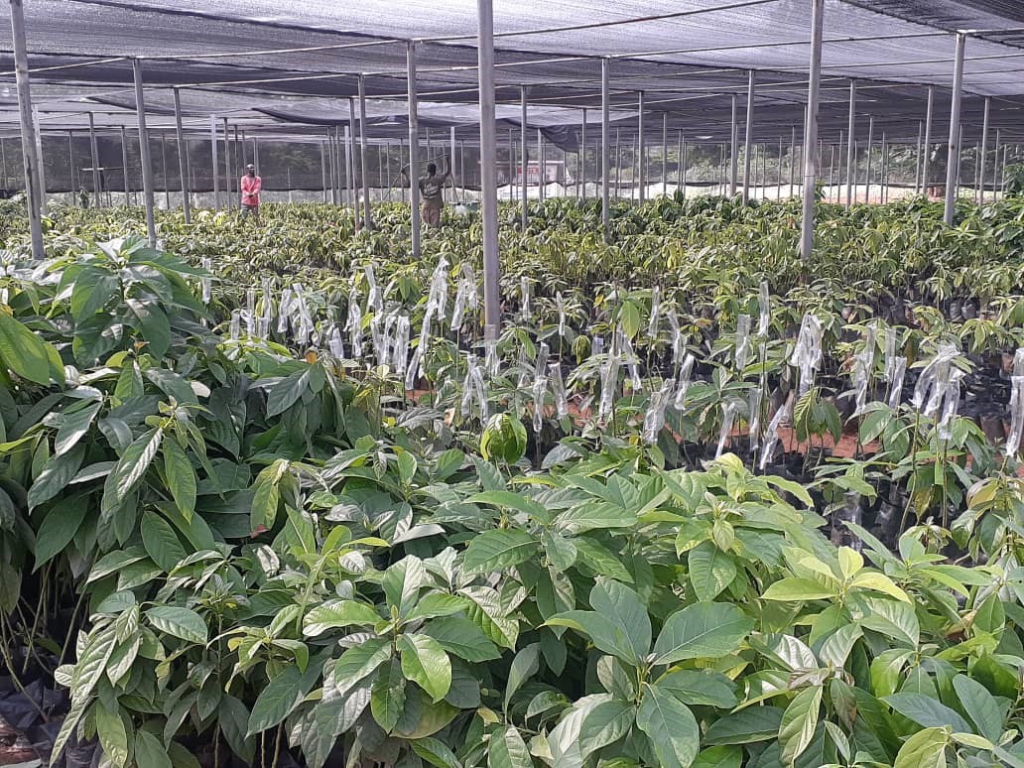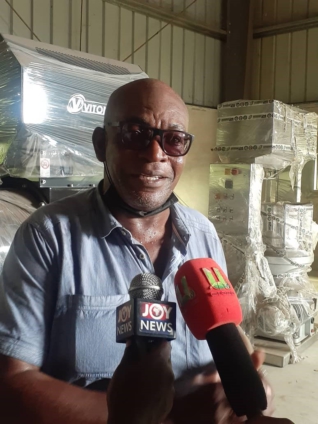Akuapem Gold Agro Processing Company Limited (AGAPCo), an avocado processing entity established under the one district, one factory (1D1F) initiative, has hinted of the heavy investment made into its raw material base to ensure security in raw material base when full capacity production begins.
According to management of the company, for every processing factory to stand the test of time, a key component in that loop is availability of raw materials in abundance to ensure constant supply for production.
To ensure that Akuapem Gold is not caught up in this web, management has invested heavily in avocado farming to ensure regular and all year-round production.
With about 28,000 acres of land secured for raw material production and about 600 acres fully cultivated in the Amotare community at Begoro in the Eastern Region, as well as several other outsourced out-growers on board, management is convinced that raw material would be in abundance to feed the factory when production begins.
“We have a huge land area already under cultivation. Usually avocado takes three to five years to start fruiting but the best agronomic practices we have put in place coupled with the ‘Hass’ variety we acquired from Kenya, has made it possible for ours to start fruiting in less than two years and this is an indication of the good investments we making here.
We also have a nursery that can feed about 1000 acres of land, so if we overcome the little land litigation challenges that we are having with some of our lands, then we can develop some extra 5,000 acres of land and offer another 15,000 acres to out growers,” Chairman of Akuapem Gold Agro Processing, Albert Kwame Wilson said.
Furthermore, he added that, technical expertise is the most important requirement to embark on such a business venture, and the company has some of the best human resource in that sector in the country on board to manage operations.
The company, which is geared toward the industrial production of avocado oil for export and domestic consumption has an installed capacity for processing 110,000 tonnes of avocado seed per day for oil production and 13,000 tonnes per day capacity for sorting seed size, as well as 300-400 metric tonnes of avocado fruit packaging per day for export.
Beyond the production of avocado oil and fresh fruits export, AGAPCo’s production line also include butter, avocado drinks, animal feed, and medicinal product, among others.

The Chairman of AGAPCo, again indicated that all is set for production to commence except for electricity connectivity which they are currently facing some challenges and hope it is addressed soon for production to start in September.
Avocado market share in 2016 was stated to be about $12 billion and projected to reach $23 billion by 2027. However, in 2019, global sales were already $23 billion and increasing, which means that demand is increasing and outstripping supply, therefore posing great opportunity for the country to rack in revenue with the right investment in the sector. Its revenue stream is said to be four times higher than cocoa.
Chief Agronomist of AGAPCo, Richard Baidoo, indicated that even though the scientific processes are being imported from Kenya, local varieties are also being grafted alongside to protect the local varieties.
He added that 10% of the crop population on the farms are local varieties with some having a good potential to attract pollination agents.
“We are cultivating the ‘Hass’ variety of avocado from Kenya because in the global avocado industry that has the most superior characteristics and in terms of oil-to-seed ratio, it is very high. The fruit is not as big as our local variety but the seed inside is huge and the oil content in the seed is the highest. So, every commercial entity will be interested in optimizing their oil extraction rate and that is why we borrowed from the Kenyans,” he said.
International Standardization
The company is taking international standardization to its utmost level by ensuring it achieves its aim of exporting to the international market, processes to meet all international standardization inculcated into the grand plan from the beginning. This, management has hinted that all documentations and requirements has been met successfully for production to commence by end of September 2021.
With Kenya gaining acknowledgement as the leading producer of avocado, AGAPCo sent its technical team to Kenya to understudy their system and benchmark the operations of the company with that.
Employment & Gender equality
AGAP, has an employment policy that is conscious of gender equality and women empowerment. As part of this, it has given opportunity to women in the neighboring communities to be in charge of bud grafting, watering and maintenance of seedling beds.
Future plans are also in place to bring on board the women in terms of harvesting of the Avocado fruits on maturity. Mr. Wilson indicated that looking at the size of plantation being developed, out growing
Latest Stories
-
Ken Ashigbey, Joyce Aryee and others grace MTN’s Festival of 9 Lessons and Carols
4 hours -
Obuasi Cricket Academy celebrates excellence at end-of-year awards night
5 hours -
WASSCE: Scanning of objective answer sheets to start tonight – WAEC
5 hours -
Education Minister hasn’t prioritised WAEC – Nortsu-Kotoe
5 hours -
Bawumia meets Manifesto Committee members to express appreciation
5 hours -
To chocolate, Ghana’s pride by Bioko
6 hours -
Chartered Institute of Bankers, Ghana, confers Honorary Fellow status on Victor Yaw Asante
7 hours -
BoG marks end of year with Thanksgiving Service
7 hours -
Ghana’s Next Sports Minister: The Debate Begins
7 hours -
Election 2024: NPP advised to be mindful of the reasons being ascribed to their election lost
7 hours -
GNFS urges Ghanaians to prevent fires during yuletide
7 hours -
Report tobacco users who smoke publicly – FDA advises
8 hours -
Abdallah Ali-Nakyea elevated to Associate Professor at UG School of Law
8 hours -
Kick2build commissions 5 libraries in Klo Agogo, donates school supplies
8 hours -
Slim and Fit Ghana donates to kids at Motherly Love Orphanage in Kwabenya
9 hours

